Summer School 2024 of CSI
Source:CSI
2024-08-18
From July 13 to 22, 2024, the "11th Summer School of the Chinese Society for Immunology (CSI)," hosted by the CSI, supported by the Inner Mongolia Association for Science and Technology, and co-organized by the Inner Mongolia Society for Immunology and the Inner Mongolia Medical University, was held in Hohhot, Inner Mongolia.
On the morning of July 14, the opening ceremony of the summer school and the new book launch of the "Human Health and Immunity (Chinese-Mongolian Edition)" took place. The CSI President, Prof. Yuzhang Wu in his opening speech expressed his gratitude to the experts and colleagues who have supported training courses on immunology and welcomed 90 PhD students from across the country. He emphasized the strategic importance of immunology in the field of life and health, noting that under the leadership of the China Association for Science and Technology, the summer school for doctoral students of the Chinese Society for Immunology has become a distinguished education activity with a unique brand of "strengthening the association through party-building."
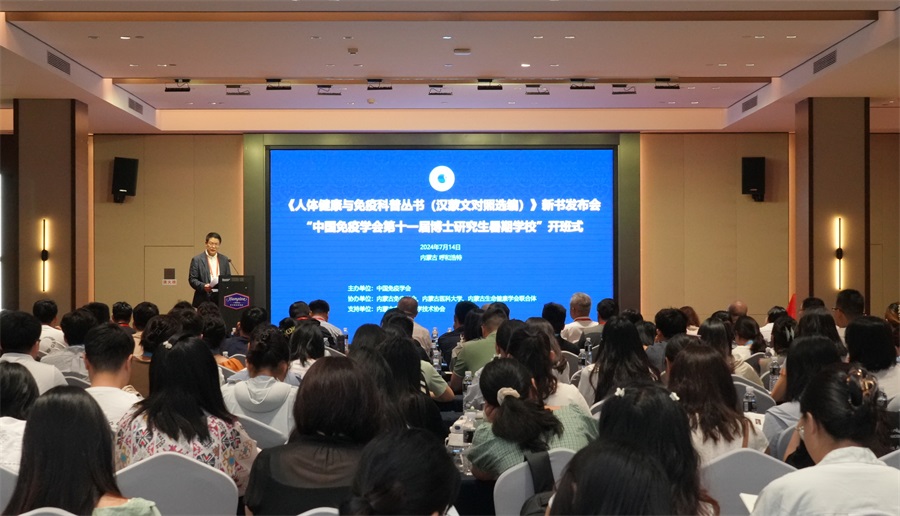
The first lecture after the opening was delivered by Mr. Leyong Song from Guangming Online, who taught a course on network security. The course highlighted the importance of political concepts, indicating that matters involving national politics and sovereignty are sacred and inviolable. This ideological and political course inspired the students' patriotism, providing them with a deeper understanding of the indivisibility of national territory and the significance of the national flag.
Prof. Yuzhang Wu, gave a report titled "Human Immunity: Decoding, Evaluation, Intervention and Reconstruction," opening the door for students to explore mechanisms of immune regulation and develop immunotherapy strategies. With his extensive academic background and profound professional knowledge, Prof. Wu vividly described the history and current challenges in immunology, enhancing students' understanding of basic immunological principles and showcasing the significance of immunology in disease treatment and prevention, as well as discussing frontier research and emerging technologies in immunology. The students learned practical methods and approaches for solving real-world problems using immunological knowledge and techniques.
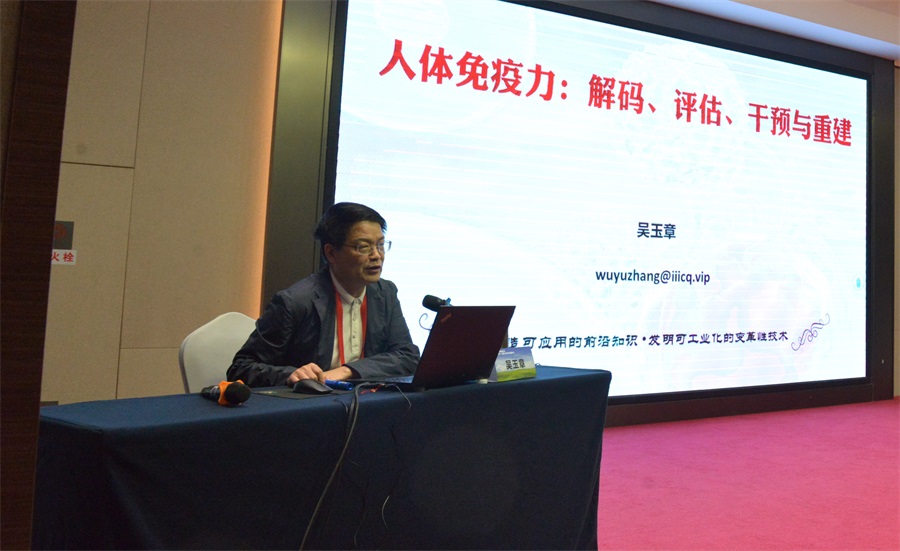
Vice President of CSI, Prof. Bing Sun from the Chinese Academy of Sciences, presented a report on "the Development and Differentiation of CD4+ T Cells, Their Functions, and Roles in Diseases." Prof. Sun systematically explained three aspects: 1. the hypothesis and development of CD4+ Th cell differentiation; 2. the regulatory roles of different Th cell effector subpopulations in various diseases; 3. the anti-tumor effects of targeting Treg cells in tumor sites. The students gained a deeper understanding of how immune cells function within the body.
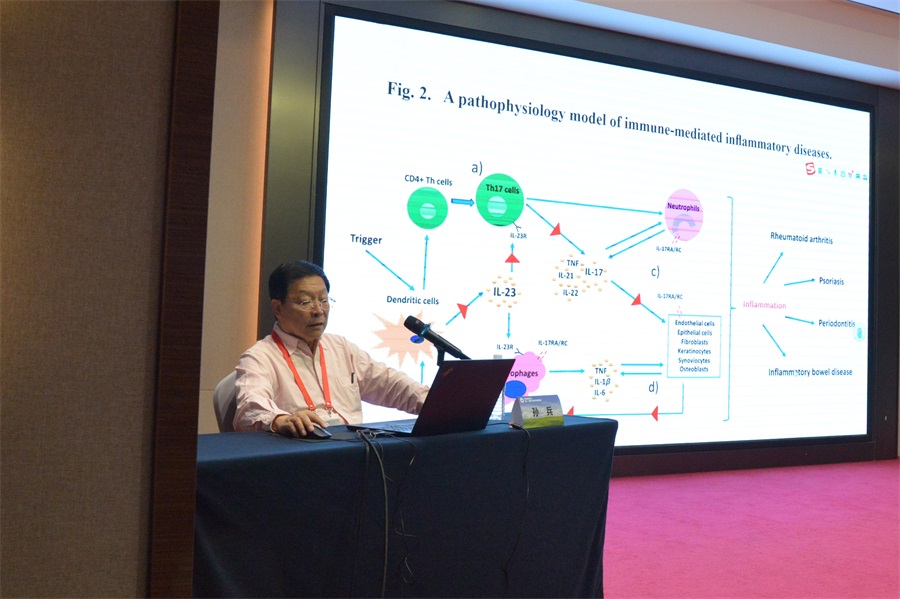
Prof. Yiwei Chu from Fudan University, also Vice President of CSI, gave a report titled "B Cells and Their Mediated Biological Functions." Professor Chu detailed the development, differentiation, subpopulations, activation, and biological functions of B cells, highlighting their importance in the immune system.
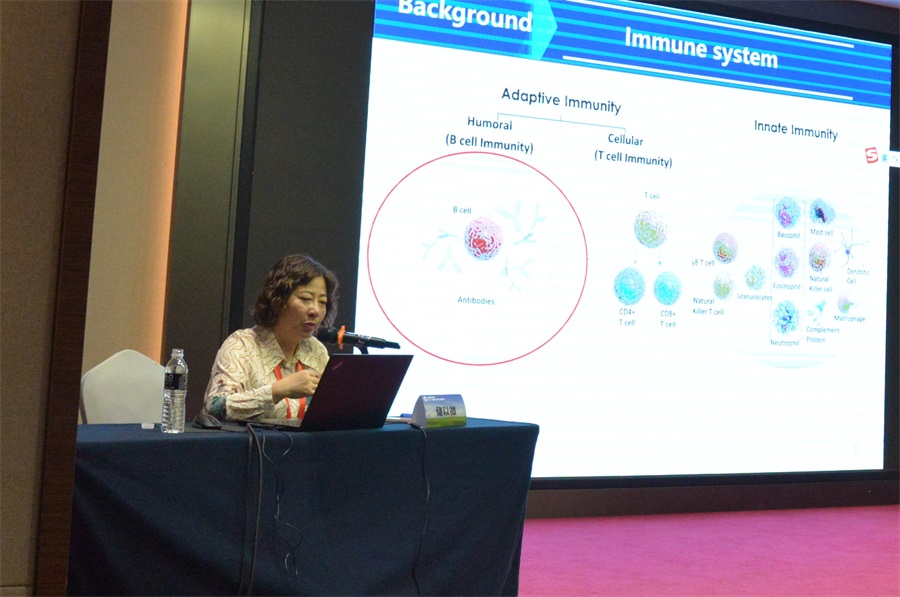
Professor Li Wu from Tsinghua University, also Vice President of CSI, delivered a lecture titled "Antigen Presenting Cells in Anti-tumor Immunity." Professor Wu introduced the development and functions of dendritic cells (DCs), especially the phenomenon of antigen cross-presentation, furthering students' understanding of DCs and discussing methods for DC cell culture and induction.
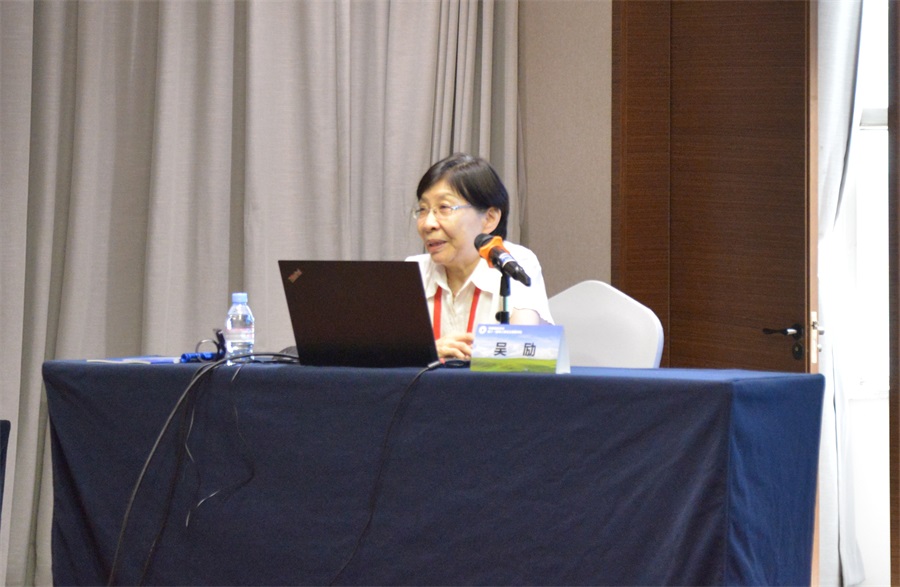
Professor Wanli Liu from Tsinghua University gave a report titled "Mechanisms of Antibody Response Initiation and Its Disorders in Related Diseases." Starting with B cells, Professor Liu explained how B cell antigen receptors specifically recognize pathogens, leading to cell activation, proliferation, and antibody production. He discussed the mediation of immune recognition and activation by B cells and the progress and applications of B cell biology in immune evasion. During his talk professor Liu engaged in deep interactive exchanges with the students to inspire their innovative thinking.
Professor Jie Zhou from Tianjin Medical University presented a report on "Type 2 Innate Lymphoid Cells and Asthma." Professor Zhou described the use of high-resolution live-cell single-molecule fluorescence imaging technology combined with traditional immunological and biochemical research methods to study mucosal immunity and asthma. Her lecture benefited the students greatly.
Professor Anlong Xu from Beijing University of Chinese Medicine delivered a report titled "The Origin and Evolution of the Immune System." Professor Xu explained the presence of the immune system in the lowest existing chordate - amphioxus, and the discovery of protoRAG, discussing the concept of immunity from the perspective of traditional Chinese medicine, providing students with new insights into understanding the immune system. This knowledge is of significant importance for the students’ future research in immunology and reproductive medicine.
Professor Lilin Ye from the Army Medical University gave a report titled "Multilevel Cellular Mechanisms of PD-1 Immune Therapy Response." Professor Ye systematically introduced the multilevel cellular mechanisms of PD-1 immune therapy response, especially the clinical application value of his research on tumor-circulating exhausted T cells.
Professor Yan Shi from Tsinghua University presented a report titled "Triggering and Effects of Innate Immunity." Professor Shi began with the classification of histocompatibility antigen molecules, mainly discussing the triggering and effects of innate immunity, explaining the genes of MHC class I and class II molecules in humans and mice, giving students a deeper understanding of these aspects.
Professor Zhengfan Jiang from Peking University gave a report titled "Innate Immunity and Anti-viral and Anti-tumor Immunity." Professor Jiang systematically explained the origins and developments of innate immunity, combined with laboratory work, and introduced the role of the cGAS-STING pathway in intracellular pathogen recognition, immune surveillance, and therapy against infections and tumors. He explained the "Manganese Immunity Method," providing students with a more intuitive understanding of the translation of basic experiments to clinical treatment.
Professor Yongguang Yang from the First Hospital of Jilin University presented a report titled "Transplant Immunity and Xenotransplantation." Professor Yang, who has extensively studied transplant immunity for years, successfully constructed humanized mouse models with high levels of human red blood cell and platelet reconstitution and humanized pig models, laying the foundation for the preparation of "living" bioreactors. He encouraged students to choose transplant immunity as their research direction.
Professor Yangxin Fu from Tsinghua University gave a report titled "New Strategies for Cancer Immunotherapy." Professor Fu provided students with a new perspective on the link between DNA damage response and immune activation. The students learned how radiotherapy and chemotherapy induce DNA damage and activate the immune system, with a key role of the cGAS-STING pathway.
Professor Mingzhao Zhu from the Institute of Microbiology, Chinese Academy of Sciences, presented a report titled "Lymphoid Tissue Microenvironment and T Cell Development, Homeostasis, and Responses." Professor Zhu systematically explained the overall process of T lymphocyte development in the thymus and the characteristics of different T cell subtypes, giving students a deeper understanding of lymphoid cell development.
Professor Bo Huang, the Vice President and Secretary-General of the CSI, from the Chinese Academy of Medical Sciences and Peking Union Medical College, gave a report titled "Long Journey of CD8+ T Cells: From Naïve to Memory." Professor Huang detailed the origin, development, TCR diversity formation, MHC classification, antigen peptide classification, activation signal classification, and signal transduction of T cells. Using vivid language, he explained the production, maturation, antigen recognition, homing, signal activation, and memory aspects of T cell subpopulations, providing students with a comprehensive understanding.
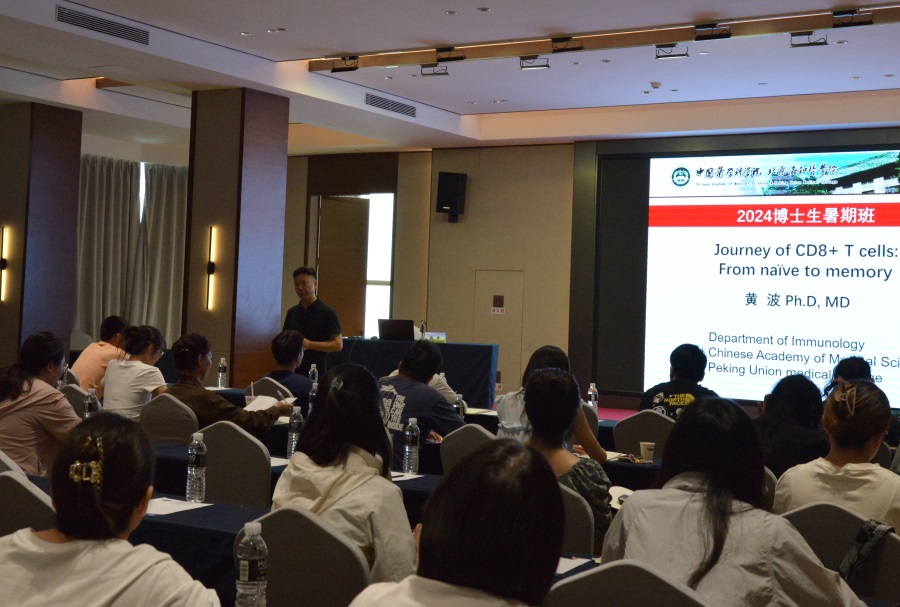
As part of the "strengthening the association through party-building" activities, on July 17, CSI organized a visit to the Ulanhu Memorial Hall, giving the students a profound spiritual and historical review. Through the guide's narration, enriched with historical photos and precious artifacts, the students learned about Comrade Ulanhu's life and revolutionary journey, from participating in the May Fourth Movement to joining the revolutionary tide, leading the Inner Mongolia Autonomous Government and participating in national construction. Comrade Ulanhu's life was filled with legendary tales and a fighting spirit. He consistently upheld the communist faith, loyalty to the party and the people, and made indelible contributions to the establishment, consolidation, and development of the Inner Mongolia Autonomous Region, as well as to the unity and prosperity of the motherland. The students gained a deeper understanding of the importance of national unity.
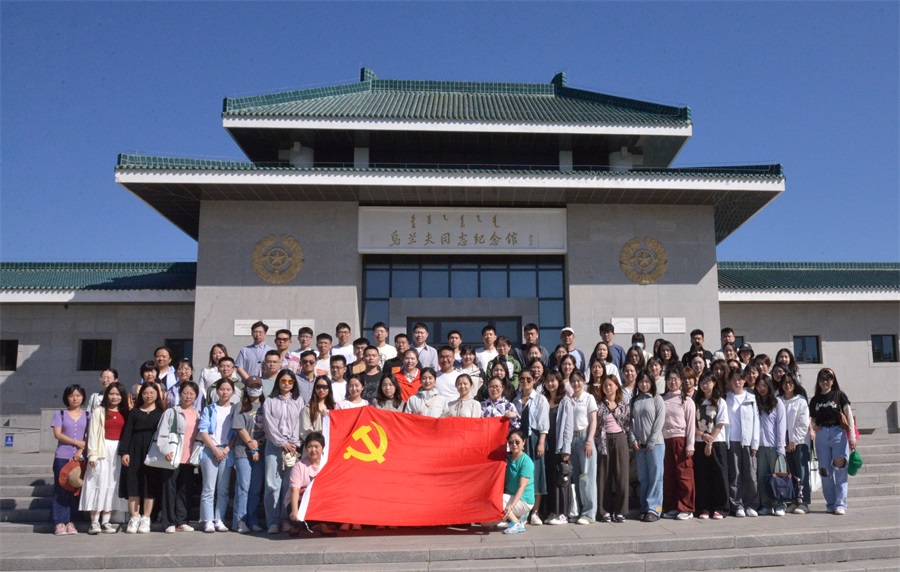
This summer school provides students with a rare opportunity for academic exchanges and communications. Students had in-depth face-to-face exchanges with experts and scholars from different regions and research fields, as well as with each other. This collision of ideas not only deepened students' understanding of immunology theory, but also inspired their thinking about scientific research methods and experimental design. After the course, students proposed that they would apply the valuable knowledge and experience gained from this training course to future research work, continue to explore, be innovative, and contribute to the development of immunology in the motherland.
On the morning of July 14, the opening ceremony of the summer school and the new book launch of the "Human Health and Immunity (Chinese-Mongolian Edition)" took place. The CSI President, Prof. Yuzhang Wu in his opening speech expressed his gratitude to the experts and colleagues who have supported training courses on immunology and welcomed 90 PhD students from across the country. He emphasized the strategic importance of immunology in the field of life and health, noting that under the leadership of the China Association for Science and Technology, the summer school for doctoral students of the Chinese Society for Immunology has become a distinguished education activity with a unique brand of "strengthening the association through party-building."

The first lecture after the opening was delivered by Mr. Leyong Song from Guangming Online, who taught a course on network security. The course highlighted the importance of political concepts, indicating that matters involving national politics and sovereignty are sacred and inviolable. This ideological and political course inspired the students' patriotism, providing them with a deeper understanding of the indivisibility of national territory and the significance of the national flag.
Prof. Yuzhang Wu, gave a report titled "Human Immunity: Decoding, Evaluation, Intervention and Reconstruction," opening the door for students to explore mechanisms of immune regulation and develop immunotherapy strategies. With his extensive academic background and profound professional knowledge, Prof. Wu vividly described the history and current challenges in immunology, enhancing students' understanding of basic immunological principles and showcasing the significance of immunology in disease treatment and prevention, as well as discussing frontier research and emerging technologies in immunology. The students learned practical methods and approaches for solving real-world problems using immunological knowledge and techniques.

Vice President of CSI, Prof. Bing Sun from the Chinese Academy of Sciences, presented a report on "the Development and Differentiation of CD4+ T Cells, Their Functions, and Roles in Diseases." Prof. Sun systematically explained three aspects: 1. the hypothesis and development of CD4+ Th cell differentiation; 2. the regulatory roles of different Th cell effector subpopulations in various diseases; 3. the anti-tumor effects of targeting Treg cells in tumor sites. The students gained a deeper understanding of how immune cells function within the body.

Prof. Yiwei Chu from Fudan University, also Vice President of CSI, gave a report titled "B Cells and Their Mediated Biological Functions." Professor Chu detailed the development, differentiation, subpopulations, activation, and biological functions of B cells, highlighting their importance in the immune system.

Professor Li Wu from Tsinghua University, also Vice President of CSI, delivered a lecture titled "Antigen Presenting Cells in Anti-tumor Immunity." Professor Wu introduced the development and functions of dendritic cells (DCs), especially the phenomenon of antigen cross-presentation, furthering students' understanding of DCs and discussing methods for DC cell culture and induction.

Professor Wanli Liu from Tsinghua University gave a report titled "Mechanisms of Antibody Response Initiation and Its Disorders in Related Diseases." Starting with B cells, Professor Liu explained how B cell antigen receptors specifically recognize pathogens, leading to cell activation, proliferation, and antibody production. He discussed the mediation of immune recognition and activation by B cells and the progress and applications of B cell biology in immune evasion. During his talk professor Liu engaged in deep interactive exchanges with the students to inspire their innovative thinking.
Professor Jie Zhou from Tianjin Medical University presented a report on "Type 2 Innate Lymphoid Cells and Asthma." Professor Zhou described the use of high-resolution live-cell single-molecule fluorescence imaging technology combined with traditional immunological and biochemical research methods to study mucosal immunity and asthma. Her lecture benefited the students greatly.
Professor Anlong Xu from Beijing University of Chinese Medicine delivered a report titled "The Origin and Evolution of the Immune System." Professor Xu explained the presence of the immune system in the lowest existing chordate - amphioxus, and the discovery of protoRAG, discussing the concept of immunity from the perspective of traditional Chinese medicine, providing students with new insights into understanding the immune system. This knowledge is of significant importance for the students’ future research in immunology and reproductive medicine.
Professor Lilin Ye from the Army Medical University gave a report titled "Multilevel Cellular Mechanisms of PD-1 Immune Therapy Response." Professor Ye systematically introduced the multilevel cellular mechanisms of PD-1 immune therapy response, especially the clinical application value of his research on tumor-circulating exhausted T cells.
Professor Yan Shi from Tsinghua University presented a report titled "Triggering and Effects of Innate Immunity." Professor Shi began with the classification of histocompatibility antigen molecules, mainly discussing the triggering and effects of innate immunity, explaining the genes of MHC class I and class II molecules in humans and mice, giving students a deeper understanding of these aspects.
Professor Zhengfan Jiang from Peking University gave a report titled "Innate Immunity and Anti-viral and Anti-tumor Immunity." Professor Jiang systematically explained the origins and developments of innate immunity, combined with laboratory work, and introduced the role of the cGAS-STING pathway in intracellular pathogen recognition, immune surveillance, and therapy against infections and tumors. He explained the "Manganese Immunity Method," providing students with a more intuitive understanding of the translation of basic experiments to clinical treatment.
Professor Yongguang Yang from the First Hospital of Jilin University presented a report titled "Transplant Immunity and Xenotransplantation." Professor Yang, who has extensively studied transplant immunity for years, successfully constructed humanized mouse models with high levels of human red blood cell and platelet reconstitution and humanized pig models, laying the foundation for the preparation of "living" bioreactors. He encouraged students to choose transplant immunity as their research direction.
Professor Yangxin Fu from Tsinghua University gave a report titled "New Strategies for Cancer Immunotherapy." Professor Fu provided students with a new perspective on the link between DNA damage response and immune activation. The students learned how radiotherapy and chemotherapy induce DNA damage and activate the immune system, with a key role of the cGAS-STING pathway.
Professor Mingzhao Zhu from the Institute of Microbiology, Chinese Academy of Sciences, presented a report titled "Lymphoid Tissue Microenvironment and T Cell Development, Homeostasis, and Responses." Professor Zhu systematically explained the overall process of T lymphocyte development in the thymus and the characteristics of different T cell subtypes, giving students a deeper understanding of lymphoid cell development.
Professor Bo Huang, the Vice President and Secretary-General of the CSI, from the Chinese Academy of Medical Sciences and Peking Union Medical College, gave a report titled "Long Journey of CD8+ T Cells: From Naïve to Memory." Professor Huang detailed the origin, development, TCR diversity formation, MHC classification, antigen peptide classification, activation signal classification, and signal transduction of T cells. Using vivid language, he explained the production, maturation, antigen recognition, homing, signal activation, and memory aspects of T cell subpopulations, providing students with a comprehensive understanding.

As part of the "strengthening the association through party-building" activities, on July 17, CSI organized a visit to the Ulanhu Memorial Hall, giving the students a profound spiritual and historical review. Through the guide's narration, enriched with historical photos and precious artifacts, the students learned about Comrade Ulanhu's life and revolutionary journey, from participating in the May Fourth Movement to joining the revolutionary tide, leading the Inner Mongolia Autonomous Government and participating in national construction. Comrade Ulanhu's life was filled with legendary tales and a fighting spirit. He consistently upheld the communist faith, loyalty to the party and the people, and made indelible contributions to the establishment, consolidation, and development of the Inner Mongolia Autonomous Region, as well as to the unity and prosperity of the motherland. The students gained a deeper understanding of the importance of national unity.

This summer school provides students with a rare opportunity for academic exchanges and communications. Students had in-depth face-to-face exchanges with experts and scholars from different regions and research fields, as well as with each other. This collision of ideas not only deepened students' understanding of immunology theory, but also inspired their thinking about scientific research methods and experimental design. After the course, students proposed that they would apply the valuable knowledge and experience gained from this training course to future research work, continue to explore, be innovative, and contribute to the development of immunology in the motherland.


